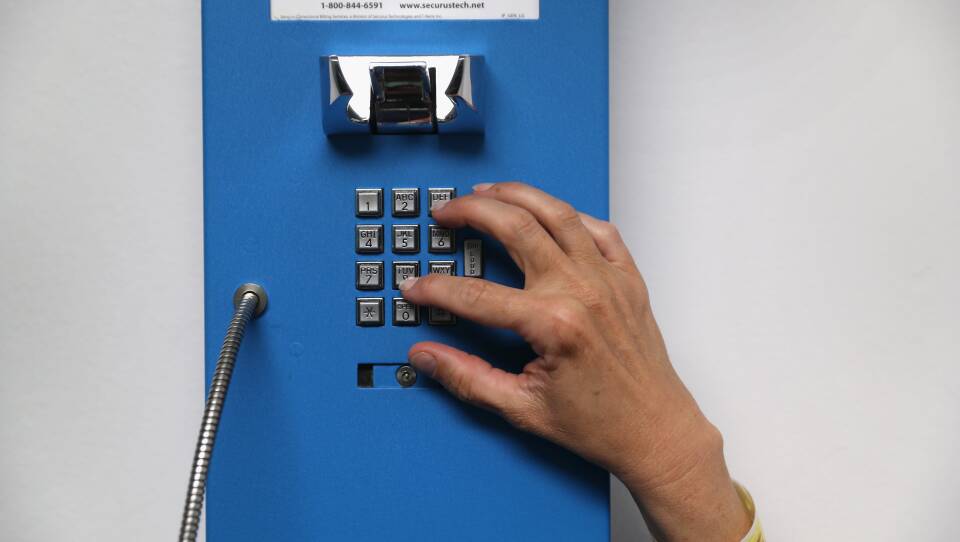It’s been a year since a law that made prison and jail phone calls free went into effect, which made Massachusetts the fifth state in the country to lift a financial burden on prisoners and their loved ones.
Legislators and advocates say that the results have been overwhelmingly positive, although there were some logistical hiccups in the launch. Correctional leaders speak similarly of the positive impact, but continue to press concerns that costs will exceed a pool of funds set aside for the law’s implementation.
“I feel it’s been great,” said Senate Majority Leader Cynthia Creem, a sponsor on the legislation. “I am all in for people being able to connect with their families, which was what the real purpose of this was.”
Calls more than doubled in the state prison system over the prior year, according to Department of Correction data from the first 11 months of the new program.
The Massachusetts Sheriffs’ Association said they’ve seen a 133% increase of calls, excluding one county.
That sudden surge in demand brought challenges though. Benjamin Silva, 48, was released from state prison this summer. He said, for the first few months, there were fights over the limited number of physical phones.
“Old Colony was where I actively saw people saying, ‘No, this is the Latin Kings’ phone,’ or, ‘This is the Gangster Disciples’ phone’ and just trying to own phones so that people could just stay on it all day long,” he said. “I saw it personally, and I’m like, this is going to get ugly very fast.”
But Silva was transferred to a lower-security state facility in Norfolk around the time the Department of Correction issued more tablets for prisoners. Those tablets included phone access during the day, cut off around bedtime in the evening.
“What I saw at Pondville went very smoothly,” he said. “They integrated the tablets, and that completely solved the problem.”
The Department of Correction worked with a vendor to add a phone application onto tablets being provided to prisoners, an effort completed in June . The calls are also used for educational purposes, with 315 people completing courses for certification on trades, like plumbing and HVAC, between January and October of this year.
Where available, tablets have also been handed out in county jails to support the no-cost call legislation, according to the Massachusetts Sheriffs’ Association.
The No Cost Calls Coalition, which advocated for the law for years, said the legal change lifted “immense financial burden off some of the most disadvantaged households in the state,” according to member Aaron Steinberg of Prisoners’ Legal Services.
But the coalition has seen logistical issues, too, including dropped calls and strained internet bandwidth for tablets after dinner — a popular time for calls. Steinberg said that could be resolved by bringing more physical phones into the facilities.
The sheriffs’ association raised its own concerns, saying that while it shares a priority of keeping incarcerated individuals connected to their loved ones, it’s a balance of keeping security stable, and not losing revenue. Its counties are seeing an average of nearly one million calls per month, since the law launched.
“We also want to note the operational challenges, which include staffing needs to monitor the increased calling and messaging, witness intimidation, and concerns regarding excessive calling,” a spokesperson for the sheriffs’ association wrote in an email.
The counties have requested extra funds to boost monitoring of calls and “reimbursement for lost programming revenues.”
A DOC spokesperson said the agency is “committed” to ensuring the program receives the funding it needs.
In its first year, the program has cost roughly $20 million, between $8.1 million so far for state facilities, according to the Department of Correction, and more than $12 million for counties, according to the Massachusetts Sheriffs’ Association.
For the current fiscal year, just $10 million was allocated to cover the program’s costs. Gov. Maura Healey had included $35 million in her initial budget proposal.
Advocates like Steinberg said that, if the sheriffs renegotiate their contracts with the calls’ providers, they can get lower rates for calls.
“I would argue that the Department of Correction and the sheriffs are overpaying. They’re paying around $0.08 a minute for calls. I believe one sheriff was paying around $0.02 per minute, which was the lowest rate in the state,” he said, adding that other states pay less.
Before the law was implemented, prisoners were charged by the minute for their calls. Different facilities would typically charge $2.40 to $2.80 for a 20-minute call, in addition to extra fees for putting money into an account.
Silva said the ability to make calls changed a lot for himself and many other prisoners.
“The impact on my life was I could establish regular calling with family and know that, ‘OK, we can carve out this time to be in contact’ — instead of it being like a random thing,” he said. “That helped solidify family ties, especially on my way out of prison. And that was something you couldn’t do before.“
“People who had lost contact with their family because the costs were so prohibitively expensive now could spend quality time with their children, their spouses — maintain those familial relationships, start to rebuild,” he said.
Hannah Reale contributed reporting.





